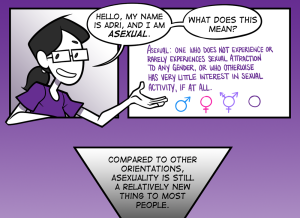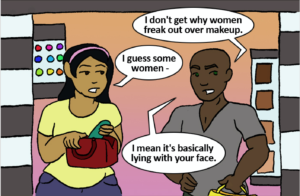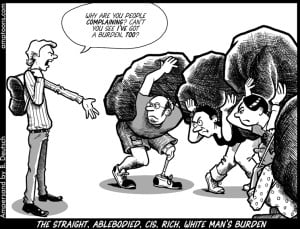People who appear to be easygoing are frequently associated with positive characteristics, like friendliness and flexibility – and many of us know just how valuable the currency of “flexibility” is in the workplace.
They’re touted as impressive, team players. They’re the first people to be recommended for promotions.
Clinicians consider them to be well adjusted. Their friends can’t resist their company. And romantic partners adore how amenable they are.
But what if who you are – that is, your most authentic self – isn’t easygoing? What if there are very real reasons why you erected clear boundaries in your life and learned how to articulate your needs?
I’m the antithesis of easygoing.
Try as I might, I don’t flow with the wind effortlessly. When I appear laid back, you can be certain that I’ve prepped myself immensely to enter that state of being, or I’m too exhausted to exert more energy, or I’m no longer invested. That is, I’ve disengaged.
I’ve noticed, though, that there’s a lot of social capital tied to appearing laid back and a lot of negative connotations attached to comfortably asserting your needs, especially as a Black woman, or a Black feminine-presenting person, or a Black non-binary person read as a woman.
From the workplace to interpersonal relationships, we’re encouraged to simply go with the current of the group – no matter how dangerous that current is.
This is especially true in the workplace, where I – quite frequently – find myself thinking:
I Know I’m Not the Only One That Can Detect Bullshit
In my recent position, I was often the only person willing to critique classist, sexist, white-supremacist ideals inherent in the way the organization was governed – and how programs and services were designed and implemented – in the presence of all my colleagues.
During one program meeting, I asked what type of message we were sending when we continue to prioritize partnerships at the expense of youth of color that are asked to wash dishes and clean the floor with toothbrushes at employers’ homes when they were hired to fill a data entry position.
Or the time I questioned why we were still partnering with employers that explicitly state they “only want to hire boys because they’re strong.”
Or the time I talked about the discriminatory practice of an employer requesting a self-portrait, alongside a résumé, from one of the youth before determining if the applicant could advance to an interview.
Each time, my white colleagues always chose to defend the sexist, classist, and white-supremacist practices of the organization’s partners – and they, subsequently, exposed their allegiances to systems of oppression.
I wasn’t the only person who picked up on these elitist and oppressive leanings, but I was almost always the only person willing to vocalize problematic practices outside the comfort of closed doors.
I recognize that many people find challenging conversations anxiety-inducing and, also, need to prioritize their health. I honor those needs. It’s not easy for me either.
However, I choose to relinquish my comfort to confront blatant and subtle manifestations of oppression.
Even still, what I’m referring to is the toxic environment that insidiously and systematically eliminates opportunities for people to dissent.
That means:
If You Buck the System, the System Always Bucks Back
Anytime I shared my concerns, I was always met with blank stares or defensive explanations about how in the “real world,” employers do [insert any oppressive or discriminatory practice here] anyway, and there’s no way to ensure our partners will adhere to a set of best practices.
While there may be some truth to these sentiments, we have an obligation to youth – and in general – to do everything in our power to create an environment that doesn’t perpetuate and normalize oppression.
Resigning to do nothing suggests that nothing can be done.
To discourage warranted critiques, designated organizational leaders with “director” in their titles often used coded language to prevent people from vocalizing unpopular opinions – this is a common silencing technique.
Saying something like: “You have to remain flexible,” even when you’re being asked to assume a higher workload without an increased salary, is a way to quell questions that could interrogate the very meaning of “flexible” in this seemingly harmless platitude.
Additionally, I find the incessant and flippant use of “flexibility” all the more condescending when it takes a great deal of flexibility – in most jobs – for people to do their jobs every time they go to work.
The way flexibility is often discussed in the workplace requires you to acquiesce to the most nonsensical demands to appear less rigid and uptight.
Behaviors like:
- Ignoring people after they’ve disagreed with you
- Or interrupting and abruptly ending conversations when people raise legitimate concerns (in this case, this happened anytime I questioned the organization’s reluctance to sever relationships with partners when we knew they were participating in biased hiring practices)
- Or having multiple, secretive conversations about one colleague six weeks prior to addressing the individual being discussed sends a message to the entire team.
There will be repercussions for articulating thoughts people in positions of power disagree with, especially when it involves interrogating their commitment to systems of oppression.
But we can always do something to resist!
When We Decolonize Our Minds, Their Oppressive Techniques Are Weakened
My closest colleagues, many of them phenomenal people, realized that there was a social benefit to maintaining an overall sense of ease and contentment in the presence of people with the ability to terminate their positions, and, by extension, their sole source of income.
They had been properly conditioned to assume an easygoing demeanor in cross-cultural spaces. They shared how they truly felt when they were in the company of people they knew would understand them – other woke people of color.
This wasn’t coincidental.
Today, there are many different terms and phrases deployed to soften the psychological damage historically marginalized people endure to remain employed in oppressive environments, including code switching, code meshing, disassociating, numbing, and reiterating “at least we’re getting paid.”
When we work in environments that reward uniformity and offer social benefits to people who always smile and nod in agreement, we learn that to resist and appear different in any way – no matter how reasonable your dissenting viewpoints are – is to risk ostracism.
This is precisely how respectability politics – a misguided survival strategy – works.
You become more concerned with how you’re perceived by outsiders and neglect the multiple ways you may be complicit in your own dehumanization.
Often, people of color are compelled to choose silence in order to maintain a sense of security, especially if they’ve routinely been in unsafe situations or learned to prioritize others’ comfort over personal and collective harm-reducing convictions.
And even more frequently, the onus is often on us to coddle and comfort the very same people who ignored our critiques and pleas, have targeted, othered, or ridiculed us, or used us as convenient scapegoats. The expectation becomes increasingly clear.
We “should” toss our hurts and needs aside to ensure the energy of the room doesn’t become too awkward and tense when we elect not to sugarcoat or contain our disdain of systems of oppression, including white supremacy, adultism, classism, sexism, and all the other harmful -isms rampant in the workplace.
Unfortunately, a lot of us ignore our needs even when we’re not concerned about remaining employed.
Many of our interpersonal relationships encourage us to decenter our needs, too.
No matter where we are, we’re often taught to negotiate ourselves away from speaking matter-of-factly about our needs, lest we be considered demanding and uptight.
Articulating Your Needs Shouldn’t Make You ‘Uptight’
I have no problem prioritizing and sharing my needs in interpersonal relationships.
But knowing how to name and explain why my needs are important, and being able to identify how to get my needs met often makes people feel uncomfortable.
It appears that owning your desires is frequently deemed – undesirable.
And I often encounter confused faces when I express interest in understanding what people need to feel appreciated, respected, supported, safe, and cared for in relationships.
When I’ve asked folks to tell me what support, care, and so on mean to them, I’ve been told, on more than one occasion, by friends and family members alike: “I don’t know…to feel supported. I’ve never thought about that.”
It’s perfectly reasonable to be asked questions you haven’t thought about before. In fact, I love these moments! What’s striking is when people then direct hostility toward you and suggest that there’s something wrong with the fact that you have thought about this.
Apparently, dedicating time to think about something as “utterly ridiculous” as your needs and desires when someone else hasn’t thought about it becomes a glaring example of your rigidity and inability to go with the flow of surface-level conversations.
And since appearing to be easygoing is positioned as the best way to be, being perceived as rigid or uptight is framed as an insult.
Despite how clever this reductive technique is:
I Will Not Decenter My Needs to Appease You
As someone who rejected gender norms at a very young age, it was only through personal critiques and honoring my authentic self that I realized I wasn’t easily swayed by external pressure to twist and contort myself into other people’s expectations of me.
But there is no shortage of attempts to convince me – women, people read as women, and non-binary feminine-presenting folks – to relax and go with the flow at a more accommodating pace.
Urging women, folks read as women, and feminine-presenting people to decenter our needs by insisting that we value being easygoing makes it easier for us to be primed to prioritize the needs of others and, simultaneously, ignore what we crave and desire.
We’re taught that knowing our needs is synonymous with “taking things too seriously” – which, might I add, is a deeply problematic notion.
Many of the folks that are in a position to decide what gets taken seriously are also the same people that deny how serious it is for people of color to receive decolonized educations.
They deny how serious it is to shift away from criminalizing people of color. They deny how serious rape culture is and the impact it has on people of every age! They deny how serious it is to deprioritize their comfort when people are speaking up about their own lived experiences and often make light of very serious social inequities.
This is why I think it’s imperative for people of color – particularly Black women, Black feminine-presenting people, and Black non-binary people read as women – to remember that there is nothing wrong with determining, acknowledging, and remaining firm in what fills you up.
Because, you know what?
We Need to Know When to Be Uncompromising
For those of us who choose to live our lives differently and opt out of following social strictures and guidelines that restrict the full breadth of our being-ness, we’re branded uncompromising.
To be honest, I actually like knowing that I can be uncompromising.
Tapping into my ability to be uncompromising has allowed me to challenge policies that reinforce discriminatory practices and dismiss the importance of nuancing the experiences of people of color.
Knowing when to be uncompromising has allowed me to sidestep dating prospects that haven’t unlearned oppressive styles of communicating and are still committed to antiquated, heteronormative gender norms.
Still, to be labeled uncompromising (read: the opposite of easygoing) can have serious social repercussions. It can mean that you’re deemed un-dateable, un-fuckable, inconsiderate, difficult to deal with, and unworthy of care and compassion.
People think they have you figured out and don’t give you the space to exist outside of their distorted interpretation of you.
After all, you’re only what people think of you, right?
Of course not!
But it’s one helluva controlling technique to get people to tap dance around their needs and to shy away from exploring and being open to what works best for them.
***
Since our worth and how well we negotiate and release our needs have been glorified – in TV shows, films, schools, work, familial dynamics, friendships, and romantic relationships – as the quintessential expression of feminine magnetism, some of us may feel inclined to shrink ourselves to get ahead professionally and to maintain interpersonal relationships.
If this is a very real struggle for you, I implore you to resist this response to external – or internalized – pressure.
Recognizing how to name and explain why our needs and values are important is critical to being able to identify and respond to situations that don’t sit right with us and to determine what truly energizes and feeds our spirits.
Sometimes, the most traumatizing experiences force us to recognize and understand our needs.
Be on the lookout for part two, where I’ll be delving into traumatic experiences that left my spirit wounded and also helped me understand why it was important to learn how to articulate my needs and set boundaries.
[do_widget id=’text-101′]
Nikia Poché is the Editorial Associate at Everyday Feminism. She’s a radical, Black, sexually fluid, androgynous, visionary, racial and social justice activist, youth development advocate, writer, and cultural critic. She writes about the importance of challenging harmful social norms rooted in imperialist white supremacist capitalist patriarchy and is constantly reimagining ways to harness her unapologetic Black rage. She’s in the process of writing her debut non-fiction book centered on disrupting dominator culture through everyday acts of resistance. In the tradition of protest writing, Nikia covers topics of race, gender, class, sexual fluidity, resistance, healing, and outlines ways to cultivate a radical imagination. To see what she’s up to, check out her personal website.
Search our 3000+ articles!
Read our articles about:
Our online racial justice training
Used by hundreds of universities, non-profits, and businesses.
Click to learn more





















